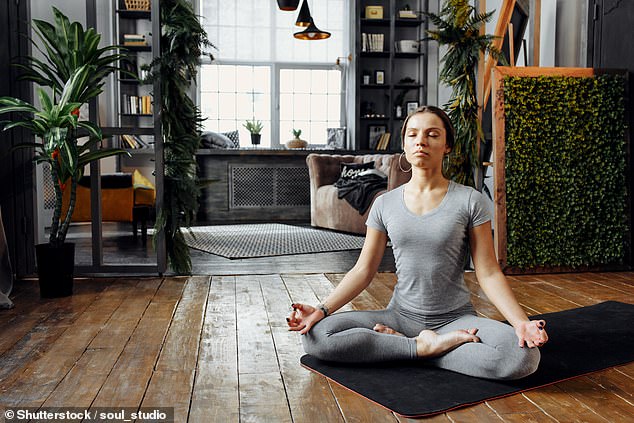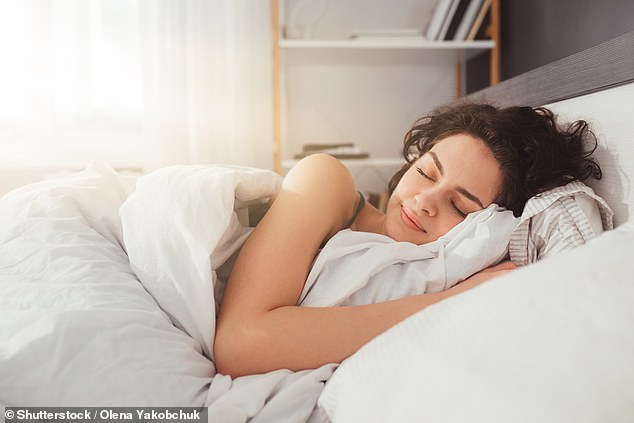When it comes to natural sleep aids, most of us are familiar with the old common-sense advice: take a bath, avoid heavy meals, and try not to look at screens.
But experts say there are many more tweaks to your nighttime routine that you may not be familiar with.
Many of these changes involve avoiding certain behaviors that you may have been doing for most of your life.
For example, skipping curry for dinner can be the difference between a fragmented night’s sleep and a restful one, Dr Ankit Parekh, an associate professor of sleep medicine at the Icahn School of Medicine at Mount Sinai, told DailyMail.com.
Below, the sleep expert reveals the most important do’s and don’ts for getting a good night’s rest without medical intervention.
Getting a good night’s sleep is easier if you train your body to maintain a consistent rhythm. Some studies have shown that people who sleep at roughly the same time each night are healthier, Dr. Parekh said.
DO NOT eat chocolate or spicy food, or do cardio.
First of all, choose your dinner wisely.
You may know that eating late (after 8 pm) is associated with weight gain and an increased risk of obesity.
But what you eat later in the evening can also affect your sleep. Specifically, eating spicy or greasy foods in the hours before bed can trigger indigestion, commonly known as heartburn.
The symptoms, which include a feeling of acid rising from the stomach to the throat, can wake you up and ruin the quality of your sleep.
Next, consider limiting your coffee consumption to morning hours only. Some research has shown that the stimulant effect of caffeine can last for about six hours after consumption.

Dr. Ankit Parekh studies how people with sleep apnea cope with the effects of a poor night’s rest.
This means your body may feel hyper-alert as you prepare for bed, making it difficult to relax. Dr. Parekh suggests stopping coffee before 3 p.m.
And while you may think a couple of beers will put you to sleep, don’t be fooled: it’s known to reduce the quality of sleep.
When people drink alcohol, they reduce the amount of time they spend in deeper stages of sleep; this is generally the period it takes the body to repair itself. According to the Sleep FoundationTherefore, missing this stage could mean you are missing out on the health benefits of quality sleep.
Regular alcohol consumption also increases the likelihood of developing sleep apnea, a condition that causes people to stop breathing while they sleep.
Alcohol can cause the muscles in your throat and tongue to relax, which can block oxygen flow. This wakes people up repeatedly, leading to a poor night’s sleep.
Next, although exercise is generally considered good for sleep, intense cardiovascular exercise should be avoided after 7 p.m., Dr. Parekh said.
This is because cardiovascular exercise can increase your heart rate and core temperature, making it difficult to fall asleep soon after.
Dr. Parekeh also stressed the importance of avoiding all types of screens in the hour before bed, whether it’s your cell phone, laptop or tablet.
Turn on the air conditioning, clean your room and take a few deep breaths.

The most important thing about your sleeping environment is that it is dark, quiet and at a comfortable temperature. But you can also practice mindfulness, meditation or yoga before bed if that helps, experts say.
A handful of simple tricks can make your bedroom as sleep-friendly as possible.
First, if you have air conditioning, set it to the ideal temperature to induce sleep, 66 to 72°F (18 to 22°C), Dr. Parekh said.
You should also make sure that your bedroom is a relaxing and tidy environment.
Tidying up the bedroom has been found to help insomniacs fall asleep faster and more consistently. A 2017 study of 1,052 volunteers found.
Research suggests Stretching, practicing mindfulness, or doing breathing exercises will also help calm the mind before going to sleep.
As for your nighttime routine, start winding down two hours before you go to sleep.
Whatever your particular routine, keeping these steps consistent will signal to your body that it’s time to start winding down, and you’ll naturally notice that you’re feeling sleepy, Dr. Zweig said.
“We need to make a slow transition to sleep,” Dr. Zweig said. This includes going to bed at about the same time every night.
Studies have shown that people who have consistent sleep schedules are healthier overall, Dr. Parekh said.
Surprisingly, experts say it’s not just what you do — or don’t do — at night that affects your sleep.
Getting enough sunlight during the day helps to establish the body’s circadian rhythm, the natural cycle of hormones that regulate wakefulness, Dr. Parekh said.
Bombarding your body with sunlight during the day triggers a natural wakefulness state that will help ensure you’re tired when the lights go out at night.
If you do all of this, you should be in a good position to get a good night’s sleep, Dr. Parekh said.


